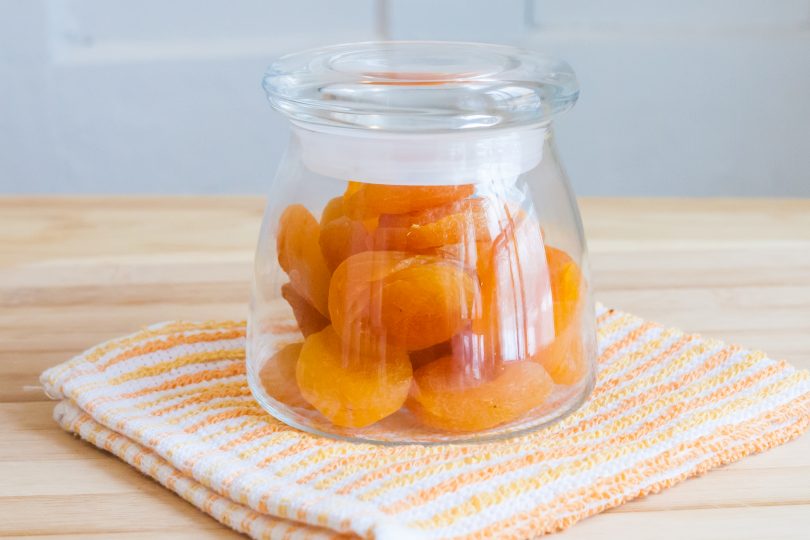READ ALSO: 15 Health Benefits of Dried Apricots
Find out what are the methods of storing dried apricots at home.
When you store dried apricots at home, you have to condition the dehydrated fruit before you store it for the next few days, weeks, or months. Dried apricots can be contaminated by insects or can reabsorb moisture.
The fruit, which should be immediately stored, must be completely cooled after drying. Why? Warm fruit leads to sweating that could provide sufficient moisture for mold to grow. Once the apricots are completely dry, pack them as tightly as you can into dry, clean, insect-proof containers without crushing the fruit.
READ ALSO: 4 Different Methods of Drying Apricots
How to Store Dried Apricots
Conditioning apricots
After drying the apricots, make sure the moisture content should be around 20%. When you have finished drying the fruit, the remaining moisture may not be equally distributed due to their location in the dehydrator or also due to their size. The conditioning process equalizes the moisture and reduced mold growth risk.
Take the cooled dried apricots and loosely pack them in glass or plastic jars. Tightly seal the containers and let the containers stand for 7-10 days. The drier pieces absorb some pieces’ excess moisture. Each day, shake the jars to check moisture condensation and separate the apricot pieces.
Tips for storing dried apricots
Drying apricots is one of the best ways to preserve the fruit. However, you must do the process right or you may be seeing mold in your fruit or you may be smelling bad fruit. Once you have dried and conditioned the apricots, cool them at room temperature. You may pack them in polyethylene bags that are moisture-proof or store them in lidded glass jars.
Store dried apricots in dry, clean home canning jars, in plastic freezer bags, or in tight-lidded plastic freezer containers. You may also want to consider vacuum packing. Vacuum sealing removes air. This keeps mold and moisture away from the dried apricots. Thus, a vacuum sealer can be a good investment if you intend to make drying apricots or other fruits a regular process.
Pack apricots in amounts that are required in a recipe. Before storing in a metal can, if you will store it in a metal can, place the dried apricots in a plastic bag. The fumes from sulfur will have a reaction with the metal and may cause the apricots’ color to change. Your apricots may even smell odd.
Since heat affects food quality, the storage temperature helps to determine storage duration. When the temperature is higher, you can only store the apricots for a relatively shorter time. Thus, refrigerate the dried apricots if you want to keep them around much longer.
The most important thing to consider is the label. Label every container with the packed date and what kind of fruit you are storing. It is important to know the packing date, so you can use older dried apricots before they start to lose their freshness.
How long dried apricots last?
Bear in mind that you can keep them in the pantry or refrigerator for 6 to 12 months. If you freeze them, they can last you for 12 to 18 months. The important thing to remember is to store dried apricots in a dry, cool area. To maximize dried apricots’ shelf life after opening, place them in a heavy-duty plastic bag or in an airtight, tightly-sealed container.
Another storage tip is to pack apricots in ‘serving size’ amounts before you store them in the freezer. When you do this, you take out what you need every time. This allows your dried apricots to faster reach room temperature and keep the rest of your dried fruit from being taken out and in of storage. Storing the apricots individually will make sure you aren’t continually closing or opening the container, which can allow air to enter and hasten the spoiling and molding process.
However, if apricots are not properly dried and conditioned, sealing them in airtight containers and putting them in dry places may be a useless effort. Apricots can become spoiled. If you are suspicious of the apricots’ freshness, smell and look at the dried fruit. Get rid of dried apricots if there is mold or have an off appearance or smell.
Apricots are both healthy and delicious, and both fresh and dried apricots are equally beneficial. When you store dried apricots, there are added advantages – the drying process is easy and they are easy to store. If you have a lot of apricots at home and you can’t consume them fast enough, it’s better to dry them, store them, and consume at your convenience.
Thank you for the image leafTV





